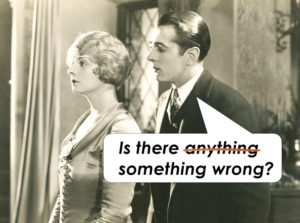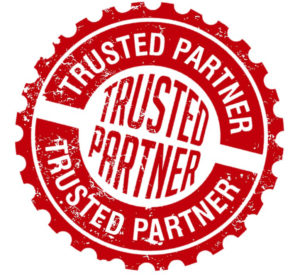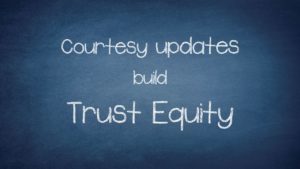Trusted Advisor Customer Service Blog Posts
Written By Jeff Mowatt – (all original content not AI generated)
Written By Jeff Mowatt – (all original content not AI generated)
One word that builds customer trust and intimacy
 I’ve written before about phrases that have the opposite effect of our intended meaning with customers: “To be honest with you…” or “To tell you the truth…” or “Trust me...” They indicate the speaker will now tell the truth; implying everything else has been lies. Those phrases actually reduce trust; the opposite of what we’re trying to achieve. Today, I want to focus on one word that does in fact build trust.
I’ve written before about phrases that have the opposite effect of our intended meaning with customers: “To be honest with you…” or “To tell you the truth…” or “Trust me...” They indicate the speaker will now tell the truth; implying everything else has been lies. Those phrases actually reduce trust; the opposite of what we’re trying to achieve. Today, I want to focus on one word that does in fact build trust.
Did you notice it? I used it two sentences ago. It’s the word actually. It’s a useful word when you need to correct or disagree with someone, without being disagreeable. It has even more impact when you lower your voice and pause right after saying it. Ie. Customer: “That inspection could delay the project.” Your low-key reply: “Actually, (pause) the inspector will be there tomorrow, so we’ll still be on time.”
The word actually implies you’re sharing an evidence-based fact. When said in a low tone, it suggests this is confidential intel that you are revealing with someone you trust, like sharing a secret. Not bad results for one word.
Two common words to avoid using with customers
Which of these better describes the types of products and services that your organization provides:
- We provide products and services that give customers fun and pleasure to own or consume. ie resort vacations, spa services, luxury vehicles.
- We provide products and services that customers need, usually in order to get something else done. ie. parts, repairs, accounting service, contracting, admin.
If your organization is more in the b) category, or if you sell business-to-business, then chances are your team members are inadvertently losing trust with your customers, without even knowing it. Here’s why.
Customers of the b) category type organizations are often making grudge purchases. They don’t want to buy your products or services, they need to buy them. That’s why there’s often a disconnect and a loss of trust when your team members ask customers questions like, “Would you like to schedule a meeting? “Do you want us to put together some prices?” Frankly, customers don’t want to go through this process at all. So, asking customers what they’d like or want reduces trust.
Fortunately, there are 3 alternative phrases that build trust; particularly when you are selling to businesses or to customers who are making grudge purchases. You’ll learn these and many more at my upcoming live stream seminar. Check it out at Trusted Advisor Seminar
Why people who foul-up get more recognition than you
 “One of my biggest mistakes early in my career? Assuming that if I just worked hard and diligently, my bosses and customers would recognize and reward me.” This was a Senior VP of a medium sized company who was bringing me in to stage virtual training for his team. We were discussing the importance of being noticed by customers and the fact that often our service only registers when things go wrong. The result - you can be doing wonderful things for your customer (or your boss and co-workers) and generate zero loyalty or rewards from it. Ironically, others who foul-up - but who recover and ‘save the day’ - are often suddenly noticed and rewarded. It’s not fair. And it happens a lot; particularly when it comes to serving internal customers. Is this ever the case for you and your team members?
“One of my biggest mistakes early in my career? Assuming that if I just worked hard and diligently, my bosses and customers would recognize and reward me.” This was a Senior VP of a medium sized company who was bringing me in to stage virtual training for his team. We were discussing the importance of being noticed by customers and the fact that often our service only registers when things go wrong. The result - you can be doing wonderful things for your customer (or your boss and co-workers) and generate zero loyalty or rewards from it. Ironically, others who foul-up - but who recover and ‘save the day’ - are often suddenly noticed and rewarded. It’s not fair. And it happens a lot; particularly when it comes to serving internal customers. Is this ever the case for you and your team members?
There are several strategies for addressing this that I share in my seminars. Here’s one quicktip - proactively provide your internal and external customers with “Courtesy updates”. In point form summarize actions you’ve completed or progress you’ve made on their behalf that they might not be aware of. Begin each point with an active verb: i.e., completed… inspected… confirmed… etc. By positioning this as a courtesy you’re not perceived as bragging, you’re proactively keeping them updated. The fact that it also reminds them of your exceptional service is a bonus.
In a perfect world this wouldn’t be necessary. In the real world, not doing this practically guarantees we are selling ourselves short.
Two tips for getting faster replies to your emails
 Chances are you’ve experienced delays at work waiting for someone to respond to your email. That person may be overloaded or unorganized and yet you’re held responsible for the lack of progress. Here are two tips to get faster replies to your emails.
Chances are you’ve experienced delays at work waiting for someone to respond to your email. That person may be overloaded or unorganized and yet you’re held responsible for the lack of progress. Here are two tips to get faster replies to your emails.
First tip - modify your subject line from being a topic title to instead being a question with the person’s name in it. Contrast a typical subject line: “Century project” vs “Al, what’s the ETA on the century project please?” The second subject line lets the recipient know that this email is requesting a brief reply, increasing the chances they’ll respond more quickly.
The second tip for generating faster more favourable replies to emails is wonderfully simple. Emails are often impersonal and cold. That doesn’t mean we need to start with a paragraph of personal remarks causing the email to seem longer (making it less likely to get a response). Instead, simply adjust your opening salutation from, “Hi Karina,” to instead, "Good morning Karina,". Not only is good morning (or afternoon or evening) a warmer, more personalized greeting, but it also includes a general time of day. It’s a subtle reminder for the recipient that this is a current request from a real person.
Bonus tip: If those approaches still don’t get you a fast enough response, pick up the phone.
(PS. Good for you if you noticed that this email says “Hi” instead of ‘Good morning”. I’m using it because this email goes to readers across multiple time zones).
How to grow your business in 2 minutes after hours
 Imagine you’re working late, visiting a website of a potential new supplier. Using the email form on the website, you send a short message that you’d like someone to contact you. Since it’s after hours, you hope to hear from them in the next business day or two. That’s typical.
Imagine you’re working late, visiting a website of a potential new supplier. Using the email form on the website, you send a short message that you’d like someone to contact you. Since it’s after hours, you hope to hear from them in the next business day or two. That’s typical.
Contrast that scenario to the practice used by one of my clients, Vice President of a commercial vehicle leasing business. Those after hour email inquiries (which might occur a handful of times per week) are fed directly to his cell phone. It takes him about two minutes after receiving that message to email back to the prospect stating that he’s received the inquiry and has assigned a certain team member to take care of them. That team member is copied on that email.
Pretty impressive, but there’s more.
The rep who’s been assigned to the potential customer then takes two minutes to reply to the prospect and let them know that they’ll phone them the next day and offer a time. As that potential customer, chances are you are now sitting up and taking notice of this company that’s obviously on the ball.
How hard is it for the company to make this exceptional first impression? It takes 2 minutes of two people’s time and no cash outlay! Some might object, “That’s cutting into the employee’s personal time.” That VP who takes the first emails told me. “Jeff, we give our employees their cell phone for free. If they don’t forward their business line and emails to their phone, I tell them to leave the phone at work when they leave the office.” Realistically, these emails only take 10 minutes per week of the rep’s after hours’ time. They get paid on commission, so everyone wins when they gain the new customer.
What about you and your organization? Is there room for improvement in your response time to customer inquiries?
Change One Word and Sell 78% More
 Imagine changing one-word and having it boost your business. It comes from a study I found out about from Dr Rumeet Billan. She was presenting at the Cdn Assoc of Professional Speakers virtual convention.
Imagine changing one-word and having it boost your business. It comes from a study I found out about from Dr Rumeet Billan. She was presenting at the Cdn Assoc of Professional Speakers virtual convention.
Medical doctors were instructed to ask patients one of two questions at the end of the visit: 1.“Is there ANYTHING else you want to address in the visit today?” Or 2. “Is there SOMETHING else you want to address in the visit today?” (anything vs something)
The result – those who said anything else saw zero increase in meeting patients’ unmet needs. Those who said something else addressed a whopping 78% of patients’ unmet needs! Neither question affected the length of the visit.
My sense is that asking about anything is so general in nature that it comes off as though we have no idea that there’s a problem. On the other hand, by asking if there’s something else, we are being specific. It implies we already assume there is an issue, and we just need to identify it. In essence, we are meeting the person halfway.
So next time you’re talking to a customer after they’ve made a buying decision, rather than asking the conventional, “Is there anything else…?, Instead ask, “Is there something else…?” The second phrase is significantly more likely to get them talking. Speaking of which, at home when a friend or family member is giving non verbal clues that they’re not doing well, rather than asking, “Is there anything wrong?”, instead try, “Is there something wrong?” Big difference for changing one word.
Was this helpful?
Do they love you in spite of or because of a foul-up?
 Let’s assume that generally your company does a good job of taking care of customers… it’s just that occasionally, stuff happens. The question becomes, when there’s a service failure that the company caused, what’s the fastest way to recover customer goodwill. My short answer - when companies bring me in to deliver seminars (live or virtually) - is fix the problem AND the relationship. That means that of course you’ll give them a replacement/ refund/ alternative, as any ethical organization would. However, fixing the problem doesn’t address the likely frustration, delay, inconvenience, and sometimes cash outlay that the foul-up caused for the customer. That’s why we need to also give the customer something for the hassle. That way, the customer discovers that unlike other organizations, you’ll go the extra mile when there’s a problem. In other words, they become more loyal not in spite of, but because of the service failure. It’s a significant step towards differentiating your brand and being considered by customers as their trusted partner.
Let’s assume that generally your company does a good job of taking care of customers… it’s just that occasionally, stuff happens. The question becomes, when there’s a service failure that the company caused, what’s the fastest way to recover customer goodwill. My short answer - when companies bring me in to deliver seminars (live or virtually) - is fix the problem AND the relationship. That means that of course you’ll give them a replacement/ refund/ alternative, as any ethical organization would. However, fixing the problem doesn’t address the likely frustration, delay, inconvenience, and sometimes cash outlay that the foul-up caused for the customer. That’s why we need to also give the customer something for the hassle. That way, the customer discovers that unlike other organizations, you’ll go the extra mile when there’s a problem. In other words, they become more loyal not in spite of, but because of the service failure. It’s a significant step towards differentiating your brand and being considered by customers as their trusted partner.
Service Failure? Hope you did this first…
 "Our team members need to nurture relationships with our stakeholders before there’s an incident.” This was a senior manager at a large industrial services company. I was preparing a seminar for his team and was asking which communication areas he’d like us to target. The company has a stellar safety record, part of which stems from how they communicate proactively with major stakeholders. He pointed out that if there’s ever an incident, they shouldn’t be asking who their contact is, or discovering there’s a new person that doesn’t know them. If that happens, they're suddenly put on the defensive and given no benefit of the doubt. I call this approach, building trust equity. It’s why courtesy reports and updates - even when they’re not required – are so valuable in maintaining loyalty, especially when things go wrong. How about you – are you proactively building trust equity with your customers?
"Our team members need to nurture relationships with our stakeholders before there’s an incident.” This was a senior manager at a large industrial services company. I was preparing a seminar for his team and was asking which communication areas he’d like us to target. The company has a stellar safety record, part of which stems from how they communicate proactively with major stakeholders. He pointed out that if there’s ever an incident, they shouldn’t be asking who their contact is, or discovering there’s a new person that doesn’t know them. If that happens, they're suddenly put on the defensive and given no benefit of the doubt. I call this approach, building trust equity. It’s why courtesy reports and updates - even when they’re not required – are so valuable in maintaining loyalty, especially when things go wrong. How about you – are you proactively building trust equity with your customers?
How to Eliminate Customer Conflicts – with Zero Effort
 Of all the books and tips about how to get along better with friends, family and customers, there’s one approach that I believe is the most effortless and under rated. I was reminded of it when our 17 year old daughter, Haley complained about Gail, her classmate, who apparently thrives on creating drama. Haley concluded, “I find I have to bite my tongue a lot around Gail.” “Good call,” I offered, “Remaining silent is often the smart move.”
Of all the books and tips about how to get along better with friends, family and customers, there’s one approach that I believe is the most effortless and under rated. I was reminded of it when our 17 year old daughter, Haley complained about Gail, her classmate, who apparently thrives on creating drama. Haley concluded, “I find I have to bite my tongue a lot around Gail.” “Good call,” I offered, “Remaining silent is often the smart move.”
Sooner or later in almost every relationship, people will say or do something that’s mildly annoying. While the natural response may be for us to take offense and lash out, the most powerful response is often to say and do absolutely nothing. By not responding in anger you build a reputation as someone who thinks before acting. Conflict, in order to exist, requires pushback. I’m not suggesting that we let people get away with being abusive. But it’s a reminder for all of us to choose our battles. As the expression goes, never miss a good opportunity to shut-up
I’d like your opinion…
 Imagine you’re a repeat customer of a company that’s launching a new product. Which of these two sales pitches is more likely to interest you:
Imagine you’re a repeat customer of a company that’s launching a new product. Which of these two sales pitches is more likely to interest you:
- We have an exciting new product we are about to release.
- We are about to release a new product and we’d like your opinion.
For most customers option ‘a’ sounds like an advertisement. Ads are easily tuned-out. Contrast that to option ‘b’ where the company is requesting your input. They leave it to you to determine whether it’s exciting. Since you’re asked to evaluate it, you begin to feel a sense of ownership. If you discover it is indeed that good, you’re more likely to not only buy it, but also recommend it. Quite a difference for just changing a few words. So next time you have a new product or service, consider approaching your customer with, “I’d like your opinion…”

